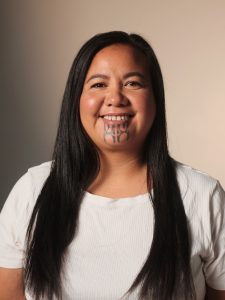Awhina Murupaenga is founder of Whatu Creative, a creative arts business with foundations in a creative upbringing at the west Auckland urban marae Hoani Waititi.
The first Kura Kaupapa Māori in Aotearoa, Hoani Waititi marae was the setting for Awhina’s childhood art classes. ‘It was normal to be surrounded by whakairo, tukutuku and kōwhaiwhai and around te reo Māori,’ she recalls.
Following a move to her whenua in Ahipara, Te Tai Tokerau, she took the helm at Te Whare Whiri Toi gallery, running arts workshops and also teaching contemporary tukutuku, as part of the government’s Creatives in Schools initiative.
When COVID-19 border rules disrupted her community connections in 2020, she moved her focus online, selling her own Tukutuku Toi Kits and building a new business within a highly challenging economic and social environment.
Inspiration in a box
The lightbulb moment came when border restrictions isolated households for weeks and months at a time. Awhina explains: ‘I wanted to create a business that promoted Māori arts in the Far North. That was the original idea, but we were in a pandemic and we couldn’t travel to Auckland. Our marae were all closed.
‘For someone who had been raised on a marae all her life, it was super hard to not be able to go there every week. So I decided to put my idea into a box. I could still import my string from China, I found a local supplier for the board, and we invented the pin tool based on a long-line fishing clip.’
The result is the Tukutuku Toi Kit, a boxed kit that enables people to learn the art and craft of tukutuku.
Right product, right fit, right time
In the years leading up to her business launch, Awhina had been educating herself on best practice. She had attended business and tax workshops, together with entrepreneurial conferences.
‘I did all the admin courses, because as creatives, we trip up on admin,’ says Awhina. ‘I registered the company, set up the website, opened a bank account, registered for GST.’
And it was during this journey of preparation that Awhina launched Whatu Creative to overnight success.
She says, ‘I was doing the Ka Hao I Te Ao e-commerce course and on the second week I put some work out there with a link to my Instagram and Facebook pages. We ended up selling about two hundred kits in one hour and making about twenty-six thousand dollars!
‘I had only invested a few thousand, so my life changed in one hour. Overnight, I had become a success.’
A Māori business with Māori values
Awhina believes her tukutuku boxes are not just an art tool – they are also aimed at wellbeing, storytelling and a connection to the environment and people.
‘People have been doing this for years,’ she says, ‘but I’m the first to modernise it and make it en masse. I’ve honed this one particular skill and I do it well.
‘There actually aren’t many Māori-owned product businesses. I also try to create best practice in driving Māori values. Many people use Māori names in business, but they don’t really practise it.
‘I look at my own business and ask, how can we lead the way? In the future, we probably will be a leading business and a leading voice, especially when it comes to matters around Māori arts and IP and misappropriation – all of those things. And having grown up on the marae, I want to be a good voice for the wider collective of Māori arts practitioners.’
Inspired by Electrify Aotearoa
Awhina attended the Electrify Aotearoa – Women Founders Conference in 2023 and came away fired up. She says she got to hear different voices and listen to amazing entrepreneurs doing fascinating work.
A key takeaway for her was learning about capital raising: ‘I’ve started to think about investment, but have been kind of put off after hearing negative stories from some women founders.
‘My wairua, my spirituality, is really important to me and I don’t want to put myself in a difficult position or compromise. So going to Electrify and hearing that the biggest ever investment capital raised was by a woman was incredible. Then meeting other women and hearing their capital raising experiences made it feel not like the end of the world.’
The scope of Awhina’s business is increasing every day as she connects with Indigenous artists around the globe. She’s now planning to support artists in other countries to represent their cultures via a similar model to Whatu Creative.
She concludes: ‘For me, I’ve done really well, but for artists it’s really hard to make a living wage, a regular wage. So creating products and services based on our knowledge and skills is actually a really good way to make art and also a living.’
